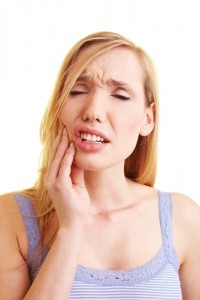 Do you often awaken in the morning to find that your jaw is sore or that your neck and shoulders feel tense? Perhaps you suffer from frequent headaches that tend to begin in the area surrounding your temples. These symptoms are common in individuals with nighttime teeth grinding and daily jaw clenching, or bruxism and temporomandibular joint disorder (TMD). Fortunately, treatment for these orofacial issues is typically non-invasive, affordable, and easily accessible at your dentist’s office.
Do you often awaken in the morning to find that your jaw is sore or that your neck and shoulders feel tense? Perhaps you suffer from frequent headaches that tend to begin in the area surrounding your temples. These symptoms are common in individuals with nighttime teeth grinding and daily jaw clenching, or bruxism and temporomandibular joint disorder (TMD). Fortunately, treatment for these orofacial issues is typically non-invasive, affordable, and easily accessible at your dentist’s office.
What Causes Jaw Clenching and Teeth Grinding?
There are a variety of reasons that people with TMD and bruxism engage in the unconscious behavior of teeth grinding and clenching. Malocclusion, or an improper bite, is a major factor, as is daily stress. While you are sleeping, you are not able to stop the overworked muscles in the jaw and face from overtaking themselves further, leading to numerous symptoms that can affect you all day.
For many, the primary complaint related to TMJ disorder is headache pain that interferes with daily functioning. The delicate joints that connect your lower jaw to your cranium can become irritated and inflamed, causing nerve pain that can even spread to your upper back. This can lead to posture problems that further exacerbate the issue. In cases of teeth grinding, the patient is typically unaware that their jaws are placing inordinate amounts of pressure on their teeth all night. Bruxism can cause tooth fractures and enamel erosion, both of which can prove to be serious problems if not treated in a timely manner.
Bruxism & TMJ Treatment
In the majority of cases, a nighttime mouthguard is used to prevent damage to the teeth caused by clenching and grinding. This custom oral appliance fits comfortably in your mouth as you sleep, helping position the jaws properly so that the muscles aren’t unnecessarily strained. Patients who have been clenching their jaws for years are surprised to find that they experience relief from their discomfort in as few as one or two nights with their new appliance.
If you believe that you or someone in your family is suffering with the ill effects of TMJ disorder or bruxism, ask your dentist about a custom oral appliance. Relief could be a phone call away!
 Every year, dentists all across the country hear complaints from their patients about tooth sensitivity. As a common oral health problem, tooth sensitivity is caused when the gums recede, exposing tooth roots. When hot or cold stimuli come into contact with these roots, a sensation is passed through the tubules in the roots directly to the nerve of the tooth, creating pain.
Every year, dentists all across the country hear complaints from their patients about tooth sensitivity. As a common oral health problem, tooth sensitivity is caused when the gums recede, exposing tooth roots. When hot or cold stimuli come into contact with these roots, a sensation is passed through the tubules in the roots directly to the nerve of the tooth, creating pain. Do you ever feel like circumstances are spinning out of your control? You’re not the only one. If there’s one thing we all have in common fairly often, it’s that stressful situations can occupy our minds and sap our energy. Not only that, stress can actually compromise your health. If you are stressed, it’s more likely that you’ll grind your teeth during sleep. While this bit of information has been around for a while, a
Do you ever feel like circumstances are spinning out of your control? You’re not the only one. If there’s one thing we all have in common fairly often, it’s that stressful situations can occupy our minds and sap our energy. Not only that, stress can actually compromise your health. If you are stressed, it’s more likely that you’ll grind your teeth during sleep. While this bit of information has been around for a while, a